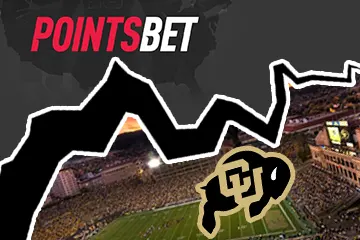 Australian sports betting operator PointsBet and the University of Colorado Boulder announced their decision to part ways and terminate their partnership amid growing criticism of the harmful effects of gambling marketing on campus grounds. The two parties entered into a five-year sponsorship agreement in September 2020 at a time when university sports departments throughout the country were beginning to struggle financially due to the coronavirus pandemic and the restrictions it brought about.
Australian sports betting operator PointsBet and the University of Colorado Boulder announced their decision to part ways and terminate their partnership amid growing criticism of the harmful effects of gambling marketing on campus grounds. The two parties entered into a five-year sponsorship agreement in September 2020 at a time when university sports departments throughout the country were beginning to struggle financially due to the coronavirus pandemic and the restrictions it brought about.
The sportsbook operator became an official partner of the Colorado Buffaloes under the terms of the deal, which allocated $1.6 million for sports betting marketing on campus grounds. The move quickly sparked controversy and was met with criticism on behalf of responsible-gambling champions and politicians. As a result of the building pressure, the two parties decided it will be ‘mutually beneficial’ to mothball their agreement and go their separate ways. The controversial sponsorship agreement underwent changes earlier this year when the two parties decided to abolish a friends referral bonus that earned the university $30 for every person who registered using the CU promotional code and placed a wager with PointsBet.
The news of the terminated partnership comes in the wake of the American Gaming Association (AGA) releasing new guidelines that aim to further restrict sports betting marketing at universities and colleges. The gambling industry trade organization amended its responsible marketing code for sports betting earlier this week.
The revised code now prohibits members of the association from entering into sponsorship partnerships with schools that encourage and advertise sports betting activities. Only marketing content related to responsible gambling initiatives is allowed after the changes. The new guidelines also disallow Name, Image, and Likeness (NIL) agreements between betting firms and young athletes under the legal gambling age of 21.
The Efficiency of AGA’s Advertising Guidelines Could Prove Limited
Some politicians argue the efficiency of the new guidelines could be unlimited due to the fact the advertising code applies only to AGA members. This might prove a major hurdle when it comes to enforcing the voluntary code of the organization. Many gambling companies that partner with schools in the US are not members of the association, including Caesars Entertainment, the official sponsorship partner of Louisiana State University (LSU) and Michigan State University (MSU). Caesars pulled out of the organization a couple of years ago, while PointsBet never applied for an AGA membership, to begin with.
Richard Blumenthal, US Senator from Connecticut, commented that the new guidelines pose a big step toward establishing nationwide standards but stressed that these should be ‘enforceable by law’. Sen. Blumenthal finds it difficult to believe that self-regulation would prove efficient when the companies with the biggest university sponsorships are not even members of the AGA.
Sports wagering regulation in the country largely takes place on a state level and some states already have similar gambling advertising restrictions written into law. Some examples include Arizona and Massachusetts where casino and sportsbook operators cannot legally market their products to individuals under the age of 21.
Sen. Blumenthal has long been a staunch critic of sponsorship agreements between gambling companies and higher educational institutions. The Senator sent a letter to Bill Miller, Chief Executive Officer of the AGA, in November 2022, voicing his concerns about Caesars’ efforts to market sports betting products on university campuses.
Earlier this week, Blumenthal announced he had issued a letter to over sixty universities and colleges, urging them to show greater transparency regarding their partnerships with betting firms. Sen. Blumenthal gave the educational institutions one month to disclose the details of their sponsorship deals with betting operators, insisting that they also reveal the amounts they anticipate generating from the partnerships.